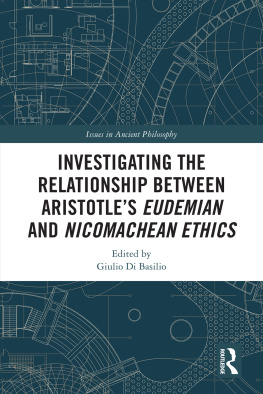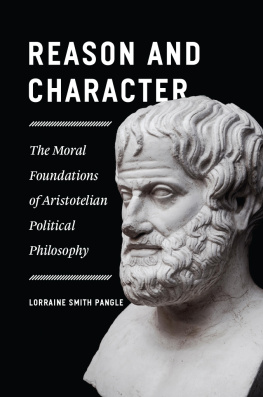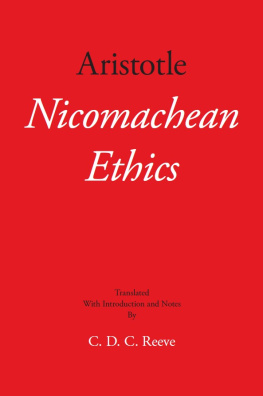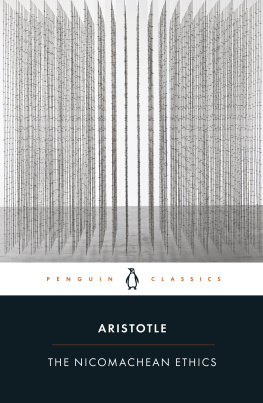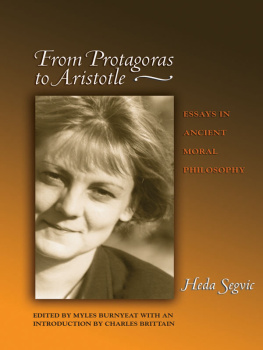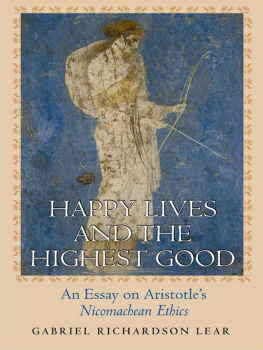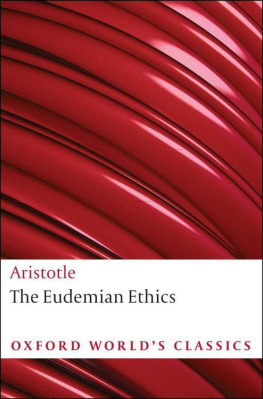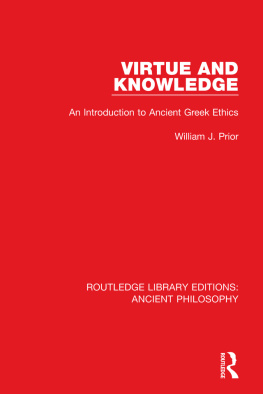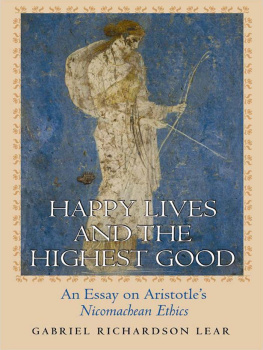
Investigating the Relationship Between Aristotles Eudemian and Nicomachean Ethics
Specifically focusing on the relationship between the Eudemian and the Nicomachean Ethics , this collection of essays studies major themes from Aristotles ethics.
This volume builds on a recent revival of interest in Aristotles Eudemian Ethics , which offers an invaluable complement to the Nicomachean Ethics in the study of the development of Aristotles ethical ideas. It brings together a series of new studies by leading scholars covering the main points of inquiry raised by the relationship between the two works, exploring their continuities and divergences. At the same time, it showcases a variety of approaches to and perspectives on the main questions posed by Aristotles ethical thought.
Investigating the Relationship Between Aristotles Eudemian and Nicomachean Ethics is offered as a contribution to long-standing debates over Aristotles ethical thinking, as well as an inspiration for new approaches, which take both of his surviving ethical treatises seriously. The volume will be of interest to students and scholars of ancient philosophy and ethics, particularly Aristotles two ethics.
Giulio Di Basilio is an Irish Research Council postdoctoral fellow at Trinity College Dublin, Ireland, and a member of the Plato Centre. He has published articles on Aristotles ethics and Aquinas philosophy of action, as well as on the text of the Nicomachean Ethics .
Issues in Ancient Philosophy
Series editor: George Boys-Stones, University of Toronto, Canada
Routledges Issues in Ancient Philosophy exists to bring fresh light to the central themes of ancient philosophy through original studies which focus especially on texts and authors which lie outside the central canon. Contributions to the series are characterised by rigorous scholarship presented in an accessible manner; they are designed to be essential and invigorating reading for all advanced students in the field of ancient philosophy.
The Hieroglyphics of Horapollo Nilous
Hieroglyphic Semantics in Late Antiquity
Mark Wildish
Taurus of Beirut
The Other Side of Middle Platonism
Federico M. Petrucci
Ancient Logic, Language, and Metaphysics
Selected Essays by Mario Mignucci
Edited by Andrea Falcon and Pierdaniele Giaretta
The Stoic Doctrine of Providence
A Study of Its Development and of Some of Its Major Issues
Bernard Collette
Investigating the Relationship Between AristotlesEudemian andNicomachean Ethics
Giulio Di Basilio
Thales the Measurer
Livio Rossetti
For more information about this series, please visit: https://www.routledge.com/Issues-in-Ancient-Philosophy/book-series/ANCIENTPHIL
Investigating the Relationship Between Aristotles Eudemian and Nicomachean Ethics
Edited by Giulio Di Basilio

First published 2022
by Routledge
4 Park Square, Milton Park, Abingdon, Oxon OX14 4RN
and by Routledge
605 Third Avenue, New York, NY 10158
Routledge is an imprint of the Taylor & Francis Group, an informal business
2022 selection and editorial matter, Giulio Di Basilio; individual chapters, the contributors
The right of Giulio Di Basilio to be identified as the author of the editorial material, and of the authors for their individual chapters, has been asserted in accordance with sections 77 and 78 of the Copyright, Designs and Patents Act 1988.
All rights reserved. No part of this book may be reprinted or reproduced or utilised in any form or by any electronic, mechanical, or other means, now known or hereafter invented, including photocopying and recording, or in any information storage or retrieval system, without permission in writing from the publishers.
Trademark notice: Product or corporate names may be trademarks or registered trademarks, and are used only for identification and explanation without intent to infringe.
British Library Cataloguing-in-Publication Data
A catalogue record for this book is available from the British Library
Library of Congress Cataloging-in-Publication Data
A catalog record has been requested for this book
ISBN: 978-0-367-34498-6 (hbk)
ISBN: 978-1-032-27168-2 (pbk)
ISBN: 978-0-429-32623-3 (ebk)
DOI: 10.4324/9780429326233
Typeset in Bembo
by Deanta Global Publishing Services, Chennai, India
Contents
Giulio Di Basilio
Carlo Natali
Friedemann Buddensiek
Marco Zingano
Giulio Di Basilio
Karen Margrethe Nielsen
Mi-Kyoung Lee
Christopher Rowe
Jozef Mller
Dorothea Frede
Giulia Bonasio
Terence Irwin
Contributors
Giulia Bonasio is Assistant Professor of Ancient Philosophy at Durham University, Durham, United Kingdom.
Giulio Di Basilio is an Irish Research Council Postdoctoral Fellow at Trinity College, Dublin, Ireland.
Friedemann Buddensiek is Professor of Ancient Philosophy at Goethe-Universitt, Frankfurt, Germany.
Dorothea Frede is Professor Emerita of Philosophy at Hamburg University, Hamburg, Germany.
Terence Irwin is Emeritus Fellow at Keble College, Oxford, United Kingdom.
Mi-Kyoung Lee is Associate Professor of Philosophy, University of Colorado at Boulder, Boulder, Colorado.
Carlo Natali is Emeritus Professor of Ancient Philosophy at Ca Foscari University, Venice, Italy.
Karen Margrethe Nielsen is Associate Professor in Philosophy at Somerville College, Oxford, United Kingdom.
Jozef Mller is Associate Professor of Philosophy at University of California, Riverside, California.
Christopher Rowe is Emeritus Professor of Greek at Durham University, Durham, United Kingdom.
Marco Zingano is Associate Professor of Philosophy at University of So Paulo, So Paulo, Brazil.
1 Introduction Aristotles Two Ethics
Giulio Di Basilio
DOI: 10.4324/9780429326233-1
1.1 Introduction: Aristotles Two Ethics
The tradition has handed down to us under Aristotles name a series of ethical writings, namely the Magna Moralia, the Eudemian Ethics (EE), and the Nicomachean Ethics (EN). Doubts of authenticity loom large over the first treatise, and the majority of scholars hesitate to treat it on a par with the other two. Currently, there is general agreement on the importance of both the EE and the EN as authoritative sources of Aristotles ethical views.
The presence of two ethical works within the Aristotelian corpus raises a number of interesting questions. Interpreters are faced with two treatises of certain authorship presenting Aristotles considered views on ethical matters. This is the only ostensible case of a subject which Aristotle has addressed twice over in his philosophical output. To make matters worse, the EE and the EN share three books in common (i.e. EN V, VI, and VII coincide with EE IV, V, and VI) transmitted to us in the manuscripts (MSS) of both treatises; these books are sometimes referred to as disputed books in contrast to the undisputed Nicomachean or Eudemian books.
Let us look more closely at the composition of Aristotles EE and EN. Both of these works start off with an investigation of the human good, then move on to enquire into virtue, alongside a number of related themes like voluntariness and decision, and then conduct a survey of the individual virtues of character, e.g. courage, temperance, and generosity. These two blocks correspond to
Next page
